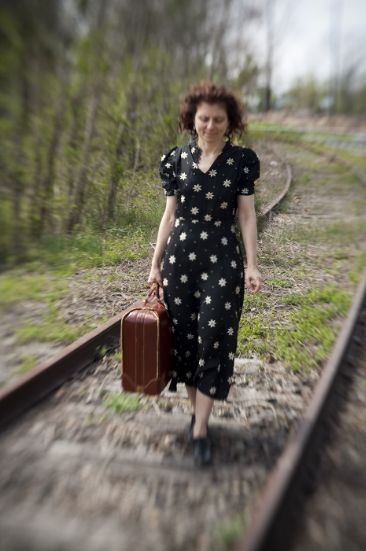
Susan Stein as ETTY, a one-woman show running as part of the 2010 Live Arts/Fringe Festival in Philadelphia. (Photo credit: Ricardo Barros)
Standing at one end of the room, alongside her only props, a suitcase and a glass of water, Ms. Stein made direct eye contact with each person in the audience as she shared Etty’s stories, philosophical reflections, painful memories, prayers, and a few songs. Unseen characters, only referred to through Etty’s words, include her mother and father, Riva and Louis; Maria and Liesl, Etty’s close friends; two younger brothers, Mischa and Jaap; Han, who owns the house where Etty lived and became her lover; and Julius Spier, a psychologist and former student of Carl Jung, and from whom Etty received psychoanalysis and later became his secretary and lover. Interaction between this engaging actress and her audience, as Etty shares her deepest thoughts and lived experiences, is comfortably intimate and never sentimental.
It is only since the mid-1980’s that the English speaking world has had access to Etty’s translated works. Her intellectual confrontation, through the sheer force of her indomitable inner spirit, of the existential despair so omnipresent in the increasingly shattered social structure that surrounded her community during the Nazi occupation is largely what constitutes the heart and soul of this brilliantly conceived play. In the expressed wisdom that seeps to the surface throughout her diaries and letters, Etty seems old for her young years. She once proclaimed that she felt ancient, which is entirely consistent with the concepts of psychological archetypes and the collective unconscious proposed by Jung. Indeed, her musings on the struggle to find strength in one’s self, even in the midst of deepest suffering, are expressed in such moving prose that one is left feeling both uplifted with hope for mankind, and at the same time, sobered by the all too present reality of existential angst that looms, though routinely suppressed, over us all.
The ways in which Etty works out for herself a pathway to inner strength enabling her to bravely deal with the harsh conditions of her time provides considerable value for our own time as well. How she comes to terms with how to act in the presence of frightful suffering is one of the many wonders of this beautifully scripted encapsulation of Etty’s contributions to all of humanity that I shall not give away in this review. Suffice it to say that the poetic perceptiveness of her reflections on her own and the lives of those around her are fascinating. In her all-too-short life, Etty longed to be a poet and there are frequent references in her writing to her favorite, Rainer Maria Rilke, who once wrote, “If your daily life seems poor, do not blame it; blame yourself that you are not poet enough to call forth its riches; for the Creator, there is no poverty.
While performances of ETTY during this year’s festival will end on September 16th, there are still opportunities for one to attend this remarkable play. Ms. Stein shared with me after her performance her plans to offer performances of this work in a variety of venues in the greater Philadelphia region, including performances that can take place in private residence as a theater party for invited guests. Ms. Stein has previously performed the play before audiences in schools, colleges, synagogues, and other play festivals throughout the east coast and Europe. One can learn about upcoming performances in the surrounding region by visiting http://www.ettyplay.org.
ETTY
Adapted and Performed by Susan Stein
Directed by Austin Pendleton
Live Arts/Fringe Performances continue:
Sep 11 7:00PM, Sep 12 2:00PM, Sep 15 2:00PM, Sep 16 7:30PM
Christ Church Neighborhood House
20 North American Street
Philadelphia, PA
www.ettyplay.org


